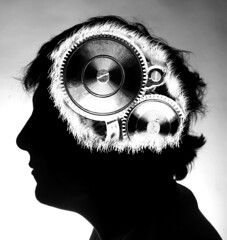 (Photo credit: Robbie Wroblewski)Anosognosia is a condition we're all familiar with, we just don't know the word.
(Photo credit: Robbie Wroblewski)Anosognosia is a condition we're all familiar with, we just don't know the word.My A-Z theme is Issues related to Mental Health or Mental Illness.
Self awareness springs from... the brain. (stay with me here) When you stub your toe, yes, you feel the pain in your toe, but it's because the brain processes the messages from the nerve endings in your toe and sends back the message, "Pain. Sharp, severe pain. Cussing will commence now."
Pain is the body's way of saying, "Danger here, pay me some attention!" Injuries like a stubbed toe can become seriously infected in a paralyzed person, because without pain, there is often no awareness of injury.
The brain also updates us on our general health and mental condition. Every night, when we sleep, it "reboots," and we wake up in the morning, conscious that we are XX many years old, that we have a cold or a backache, and that we are happy or heartbroken.
In some people, with physical brain damage due to accident or stroke, and in some people with mental illness (who may also have physical damage to or abnormalities of the brain) the brain doesn't seem to "reboot" properly. It restores an old backup, one that is not updated with the latest patches. (Think the movie 50 First Dates.)
So the person who, yesterday, fully acknowledged his bi-polar disorder and the need for staying on his medication, may today insist he is just fine. Not bi-polar, never been bi-polar - are you crazy? Why would he need to take meds?
What we are coming to realize is that many people are not simply "in denial." Yes, some people are, but others, genuinely and completely don't realize there is anything wrong with their brain because their brain tells them, "Everything's fine, move along, move along, nothing to see here."
There's an excellent book on the subject by Xavier Amador, who has pioneered a technique called LEAP to assist families and partners in dealing with those who insist, "I AM NOT SICK! I Don't Need Help!"
While anosognosia has not been intensively studied in mental disorders such as OCPD and Alzheimer's, the basic principles of Listen, Empathize, Agree, and Partner can also be applied to relationships where one person has that disorder, or even a boss or co-worker who's "difficult."
 |
| via SamirBaradwaj |
Browbeating others to agree with us is simply something that doesn't "stick," long-term. Those with OCPD and other illnesses seem to be most responsive to a person that they trust pointing them in certain directions. Establishing that trust is the best way to work towards the goal.
The goal can't be to make the disordered person say, "By Jove, you're right. I am wacko." The goal is to persuade him/her to take some action: take their meds, throw away some of their hoard, stop nitpicking at one's child...
My A-Z theme is Issues related to Mental Health or Mental Illness.
Have you had any experiences with anosognosia in your life,
either your own, or a loved one's?
either your own, or a loved one's?
Have you tried to blow somebody's cloak off with an argument?
How'd that work? Other thoughts?
Related articlesHow'd that work? Other thoughts?

